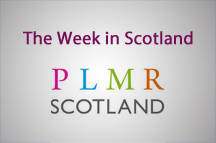 Variously described as a ‘hurricane’ and ‘tidal wave’ sweeping through the nation, this week in Scotland has been dominated by the Scottish National Party’s impressive campaign and historic election result.
Variously described as a ‘hurricane’ and ‘tidal wave’ sweeping through the nation, this week in Scotland has been dominated by the Scottish National Party’s impressive campaign and historic election result.
The Campaign
During the last week of a general election campaign that was considered too close to call, Scotland has been the one predictable element. To pollsters, pundits and politicians alike, the question was never which party would take Scotland, but rather how many of the country’s 59 seats the SNP would carry.
So Scotland stood as the ultimate decider. With a hung parliament expected, debate centred around the idea of an SNP and Labour agreement that would put Ed Miliband in Number 10.
David Cameron’s campaign insisted to voters in England that support for Labour would lead to a government held to ransom by a Scottish National Party intent on breaking up the nation. Ed Miliband countered: he would do no deals with SNP leader Nicola Sturgeon. And as leader of the Scottish Labour Party, Jim Murphy’s campaign hinged on the threat that every seat lost to the SNP would simply help the Tories get back into power – the supposed Scottish nightmare.
The politics of fear dominated and things got heated. The SNP suspended two members for clashing violently with Labour supporters at a Jim Murphy rally in Glasgow, where even Eddie Izzard’s skirt and makeup failed to lighten the mood.
The Result
 Riding on the wave of Scottish nationalism and political fervour whipped up in September’s independence referendum, the SNP has transformed Scotland’s political make-up in a dramatic landslide. They carried 56 seats (up from 6 in 2010) and virtually wiped out every other party, leaving the Conservatives, Lib-Dems and Labour with only one seat each.
Riding on the wave of Scottish nationalism and political fervour whipped up in September’s independence referendum, the SNP has transformed Scotland’s political make-up in a dramatic landslide. They carried 56 seats (up from 6 in 2010) and virtually wiped out every other party, leaving the Conservatives, Lib-Dems and Labour with only one seat each.
By any measure, it is a bloodbath. And this is exemplified most strongly by the casualties of this remarkable result. Big hitters such as the Scottish Labour leader, Jim Murphy, the ex Lib-Dem leader, Charles Kennedy, and the Chief Secretary to the Treasury, Danny Alexander, have all lost their seats.
For the SNP, the tale of this election is best told through the story of Mhairi Black, the 20 year old student who yesterday unseated Labour’s Douglas Alexander, the Shadow Foreign Secretary and Labour’s campaign chief, who had represented Paisley South for 18 years. Mhairi discovered her political calling during the referendum campaign where she cut her teeth, and discovered that she spoke the Scottish voters’ language because she was so distant from the Westminster ‘establishment’. As a Paisley voter put it: ‘Mhairi knows what it’s like to not be paid the Living Wage, the difference between her and career politicians, she speaks more to me than any other ever has’.
The Next Five Years
But what effect will this landslide have on British politics as a whole? Nicola Sturgeon (who did not stand in this election) wanted to ‘lock the Tories out of government’. This has not happened, but the SNP is now the 3rd largest party in Westminster. Despite the Tory majority, she claims, no government can be seen to be running rough-shod over the self-evident will of the Scottish people.
This election will put Scottish issues high on the agenda, she insists. The SNP has already this morning started calling for a stronger form of devolution than is currently on the table. The party has also refused to rule out renewed calls for another referendum on independence, saying it will ‘let the Scottish people decide’.
So this result will potentially have huge constitutional implications for the future of the union and for the future of our democracy. It is worth noting that the SNP have taken 56 seats with only 4.8% of the total vote in the UK. By comparison, UKIP won 12.6% of the popular vote, but took just one seat. Unsurprisingly, it’s prompted renewed calls for our first-past-the-post electoral system to be reformed.
Today’s election result confirms that whatever blow Scottish nationalism was dealt in September’s referendum defeat, the issue may still be in play in the years to come.
Holyrood
Aside from the election campaign, Holyrood business has continued (almost) as normal. The Scottish Government this week proposed a ban on the sale of non-medicinal electronic cigarettes to minors. You will not be surprised to hear this didn’t make front page news.














